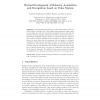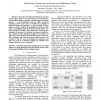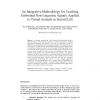1512 search results - page 166 / 303 » Qualitative reinforcement learning |
EUSFLAT
2001
13 years 10 months ago
2001
This work points out advantages for the application of fuzzy logic in organization analysis and control. From the presented motivations we propose both a managerial control cycle ...
IROS
2008
IEEE
14 years 3 months ago
2008
IEEE
Abstract. Both self-learning architecture (embedded structure) and explicit/implicit teaching from other agents (environmental design issue) are necessary not only for one behavior...
ISDA
2010
IEEE
13 years 7 months ago
2010
IEEE
Research in learning and planning in real-time strategy (RTS) games is very interesting in several industries such as military industry, robotics, and most importantly game industr...
AAAI
2010
13 years 10 months ago
2010
Understanding conceptual change is an important problem in modeling human cognition and in making integrated AI systems that can learn autonomously. This paper describes a model o...
AGI
2008
13 years 10 months ago
2008
A teaching methodology called Imitative-Reinforcement-Corrective (IRC) learning is described, and proposed as a general approach for teaching embodied non-linguistic AGI systems. I...



